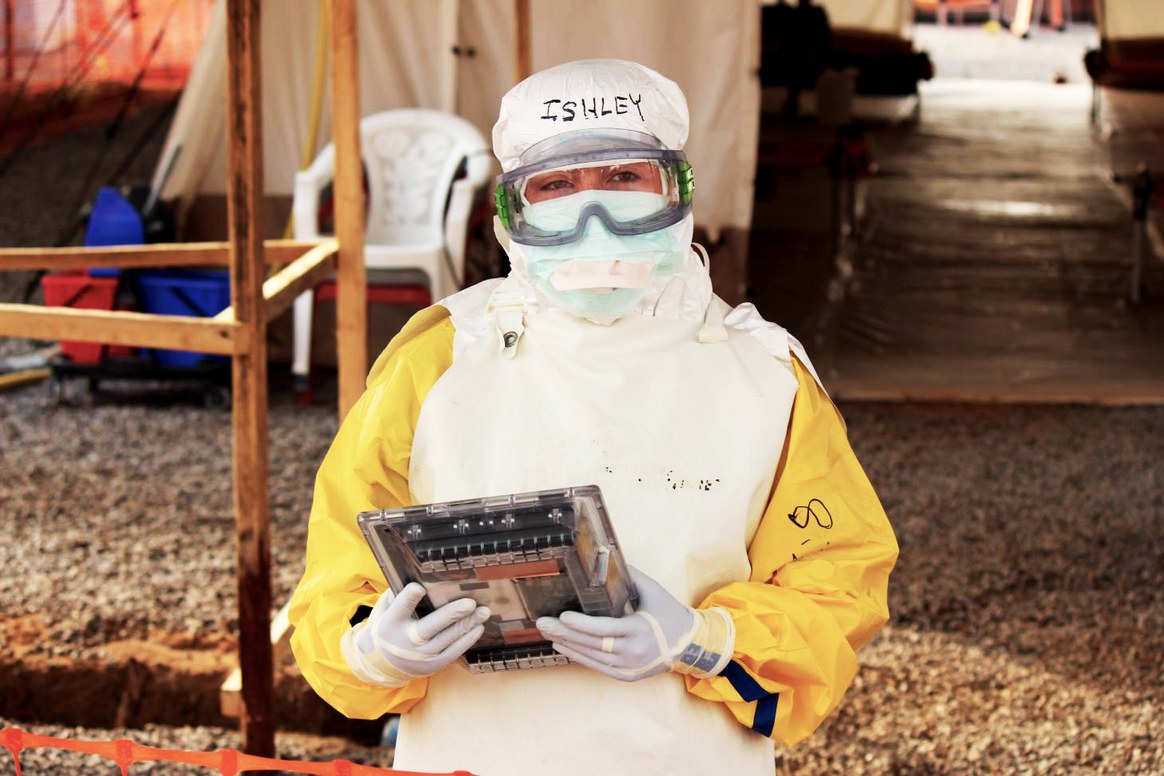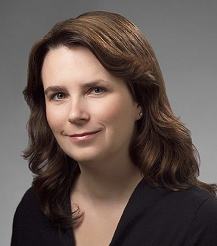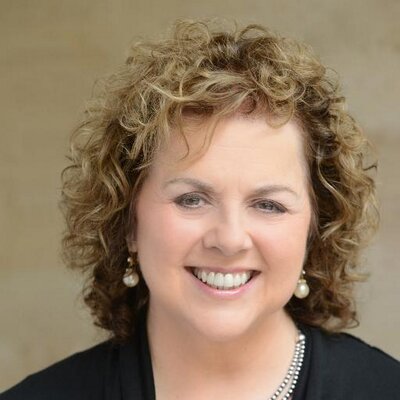 The enormity and severity of the West African Ebola epidemic that began in 2014 is hard to fathom. Over 10,000 people died with hundreds of thousands deeply affected by loss. In treating any medical condition, information is needed to provide adequate care, but when it’s an epidemic so severe, so dangerous and so fast-moving, it’s required more than ever. Ebola creates enormous barriers for patient care. It’s communicability means those who directly treat patients within the “Red Zone” must take extreme precautions. The lack of knowledge about who is infected and what constitutes effective treatment — not to mention the swift and severe toll it takes on the human body — makes caring for those affected extremely difficult...
The enormity and severity of the West African Ebola epidemic that began in 2014 is hard to fathom. Over 10,000 people died with hundreds of thousands deeply affected by loss. In treating any medical condition, information is needed to provide adequate care, but when it’s an epidemic so severe, so dangerous and so fast-moving, it’s required more than ever. Ebola creates enormous barriers for patient care. It’s communicability means those who directly treat patients within the “Red Zone” must take extreme precautions. The lack of knowledge about who is infected and what constitutes effective treatment — not to mention the swift and severe toll it takes on the human body — makes caring for those affected extremely difficult...
West African Ebola epidemic
See the following -
Development and Deployment of the OpenMRS-Ebola Electronic Health Record System for an Ebola Treatment Center in Sierra Leone
 Stringent infection control requirements at Ebola treatment centers (ETCs), which are specialized facilities for isolating and treating Ebola patients, create substantial challenges for recording and reviewing patient information. During the 2014-2016 West African Ebola epidemic, paper-based data collection systems at ETCs compromised the quality, quantity, and confidentiality of patient data. Electronic health record (EHR) systems have the potential to address such problems, with benefits for patient care, surveillance, and research. However, no suitable software was available for deployment when large-scale ETCs opened as the epidemic escalated in 2014...
Stringent infection control requirements at Ebola treatment centers (ETCs), which are specialized facilities for isolating and treating Ebola patients, create substantial challenges for recording and reviewing patient information. During the 2014-2016 West African Ebola epidemic, paper-based data collection systems at ETCs compromised the quality, quantity, and confidentiality of patient data. Electronic health record (EHR) systems have the potential to address such problems, with benefits for patient care, surveillance, and research. However, no suitable software was available for deployment when large-scale ETCs opened as the epidemic escalated in 2014...
- Login to post comments
Fighting Ebola with Open Source Collaboration
- Login to post comments
Google Builds a New Tablet for the Fight Against Ebola
Jay Achar was treating Ebola patients at a makeshift hospital in Sierra Leone, and he needed more time. This was in September, near the height of the West African Ebola epidemic. Achar was part of a team that traveled to Sierra Leone under the aegis of a European organization called Médecins Sans Frontières, or Doctors Without Borders. In a city called Magburaka, MSF had erected a treatment center that kept patients carefully quarantined, and inside the facility’s high-risk zone, doctors like Achar wore the usual polythene “moon suits,” gloves, face masks, and goggles to protect themselves from infection...
- Login to post comments
Google Builds a New Tablet for the Fight Against Ebola
 Jay Achar was treating Ebola patients at a makeshift hospital in Sierra Leone, and he needed more time. This was in September, near the height of the West African Ebola epidemic. Achar was part of a team that traveled to Sierra Leone under the aegis of a European organization called Médecins Sans Frontières, or Doctors Without Borders. In a city called Magburaka, MSF had erected a treatment center that kept patients carefully quarantined, and inside the facility's high-risk zone, doctors like Achar wore the usual polythene "moon suits," gloves, face masks, and goggles to protect themselves from infection...
Jay Achar was treating Ebola patients at a makeshift hospital in Sierra Leone, and he needed more time. This was in September, near the height of the West African Ebola epidemic. Achar was part of a team that traveled to Sierra Leone under the aegis of a European organization called Médecins Sans Frontières, or Doctors Without Borders. In a city called Magburaka, MSF had erected a treatment center that kept patients carefully quarantined, and inside the facility's high-risk zone, doctors like Achar wore the usual polythene "moon suits," gloves, face masks, and goggles to protect themselves from infection...
- Login to post comments
Google Fights Ebola
 While governments around the world were unsuccessfully trying to make up their minds about the best approach, sitting around and debating and discussing about the most valid ways to combat Ebola …Google came up to the plate in November and its CEO announced it would pledge $2 for every dollar donated through its website. They set up a specific URL onetoday.google.com/fightebola to explain this original social action and invite people worldwide to contribute to this worthwhile, timely cause...
While governments around the world were unsuccessfully trying to make up their minds about the best approach, sitting around and debating and discussing about the most valid ways to combat Ebola …Google came up to the plate in November and its CEO announced it would pledge $2 for every dollar donated through its website. They set up a specific URL onetoday.google.com/fightebola to explain this original social action and invite people worldwide to contribute to this worthwhile, timely cause...
- Login to post comments
HealthMap Co-Founder And Prominent Epidemiologist Dr. John Brownstein To Deliver Keynote At 2014 mHealth Summit Focused On Ebola Outbreak, Epidemics And Public Health Surveillance
The mHealth Summit today announced that John Brownstein, PhD...Co-Founder of HealthMap, will deliver a keynote address at the 6th annual Summit on December 10...HealthMap is a global leader in using online informal sources for disease outbreak monitoring and real-time surveillance of emerging public health threats...The HealthMap software spotted the West African Ebola epidemic nine days before the World Health Organization (WHO) announced it, triggering a global response. Read More »
- Login to post comments
How A Free Mobile App Fights Ebola And Other Global Epidemics
 The enormity and severity of the West African Ebola epidemic that began in 2014 is hard to fathom. The outbreak resulted in more than 11,000 deaths, and hundreds of thousands of people affected by loss. Providing adequate care for any medical condition depends on information, but even more so when dealing with an epidemic that is as severe, dangerous, and fast-moving as Ebola. This is the story of how a dispersed global health IT community banded together to solve the enormous, unique information challenges presented by Ebola...
The enormity and severity of the West African Ebola epidemic that began in 2014 is hard to fathom. The outbreak resulted in more than 11,000 deaths, and hundreds of thousands of people affected by loss. Providing adequate care for any medical condition depends on information, but even more so when dealing with an epidemic that is as severe, dangerous, and fast-moving as Ebola. This is the story of how a dispersed global health IT community banded together to solve the enormous, unique information challenges presented by Ebola...
- Login to post comments
Open source EHR platform tailored to treat Ebola patients
 An open-source electronic health record system developed to treat Ebola patients during the recent epidemic in West Africa is being touted as a potential solution for clinical data collection in highly infectious environments and resource-constrained healthcare settings. Implemented two years ago at Save the Children International’s Kerry Town Ebola treatment center in Sierra Leone, the EHR leverages a Java-based web application called OpenMRS that enables the design of a customized medical records system with no programming.
An open-source electronic health record system developed to treat Ebola patients during the recent epidemic in West Africa is being touted as a potential solution for clinical data collection in highly infectious environments and resource-constrained healthcare settings. Implemented two years ago at Save the Children International’s Kerry Town Ebola treatment center in Sierra Leone, the EHR leverages a Java-based web application called OpenMRS that enables the design of a customized medical records system with no programming.
- Login to post comments
The World Knows an Apocalyptic Pandemic Is Coming
 A new independent report compiled at the request of the United Nations secretary-general warns that there is a "very real threat" of a pandemic sweeping the planet, killing up to 80 million people. A deadly pathogen, spread airborne around the world, the report says, could wipe out almost 5 percent of the global economy. And we're not ready. The ominous analysis was compiled by an independent panel, the Global Preparedness Monitoring Board (GPMB), which was assembled last year in response to a request from the office of the U.N. secretary-general, and convened jointly by the World Bank and World Health Organization (WHO). Co-chaired by the former WHO head and former Norwegian Prime Minister Gro Harlem Brundtland and the head of the international Red Cross, Elhadj As Sy, the GPMB commissioned expert studies and issued a scathing attack on the political, financial, and logistical state of pandemic preparedness affairs.
A new independent report compiled at the request of the United Nations secretary-general warns that there is a "very real threat" of a pandemic sweeping the planet, killing up to 80 million people. A deadly pathogen, spread airborne around the world, the report says, could wipe out almost 5 percent of the global economy. And we're not ready. The ominous analysis was compiled by an independent panel, the Global Preparedness Monitoring Board (GPMB), which was assembled last year in response to a request from the office of the U.N. secretary-general, and convened jointly by the World Bank and World Health Organization (WHO). Co-chaired by the former WHO head and former Norwegian Prime Minister Gro Harlem Brundtland and the head of the international Red Cross, Elhadj As Sy, the GPMB commissioned expert studies and issued a scathing attack on the political, financial, and logistical state of pandemic preparedness affairs.
- Login to post comments